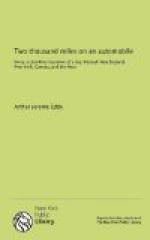We stopped at Batavia for dinner, and made the run into Buffalo in exactly two hours, arriving at four o’clock.
We ran the machine to the same station, and found unoccupied the same rooms we had left four weeks and two days before. It seemed an age since that Wednesday, August 24, when we started out, so much had transpired, every hour had been so eventful. Measured by the new things we had seen and the strange things that had happened, the interval was months not weeks.
A man need not go beyond his doorstep to find a new world; his own country, however small, is a universe that can never be fully explored. And yet such is the perversity of human nature that we know all countries better than our own; we travel everywhere except at home. The denizens of the earth in their wanderings cross each other en route like letters; all Europe longs to see Niagara, all America to see Mont Blanc, and yet whoever sees the one sees the other, for the grandeur of both is the same. It does not matter whether a vast volume of water is pouring over the sharp edge of a cliff, or a huge pile of scarred and serrated rock rises to the heavens, the grandeur is the same; it is not the outward form we stand breathless before, but the forces of nature which produce every visible and invisible effect. The child of nature worships the god within the mountains and the spirit behind the waters; whereas we in our great haste observe only the outward form, see only the falling waters and the towering peaks.
It is good for every man to come at least once in his life in contact with some overpowering work of nature; it is better for most men to never see but one; let the memory linger, let not the impression be too soon effaced, rather let it sink deep into the heart until it becomes a part of life.
Steam has impaired the imagination. Such is the facility of modern transportation that we ride on the ocean to-day and sit at the feet of the mountains to-morrow.
Nowadays we see just so much of nature as the camera sees and no more; our vision is but surface deep, our eyes are but two clear, bright lenses with nothing behind, not even a dry plate to record the impressions. It is a physiological fact that the cells of the brain which first receive impressions from the outward organs of sense may be reduced to a condition of comparative inactivity by too rapid succession of sights, sounds, and other sensations. We see so much that we see nothing. To really see is to fully comprehend, therefore our capacity for seeing is limited. No man has really seen Niagara, no man has ever really seen Mont Blanc; for that matter, no man has even fully comprehended so much as a grain of sand; therefore the universe is at one’s doorstep.
Nature is a unit; it is not a whole made up of many diverse parts, but is a whole which is inherent in every part. No two persons see the same things in a blossoming flower; to the botanist it is one thing, to the poet another, to the painter another, to the child a bit of bright color, to the maiden an emblem of love, to the heart-broken woman a cluster of memories; to no two is it precisely the same.




